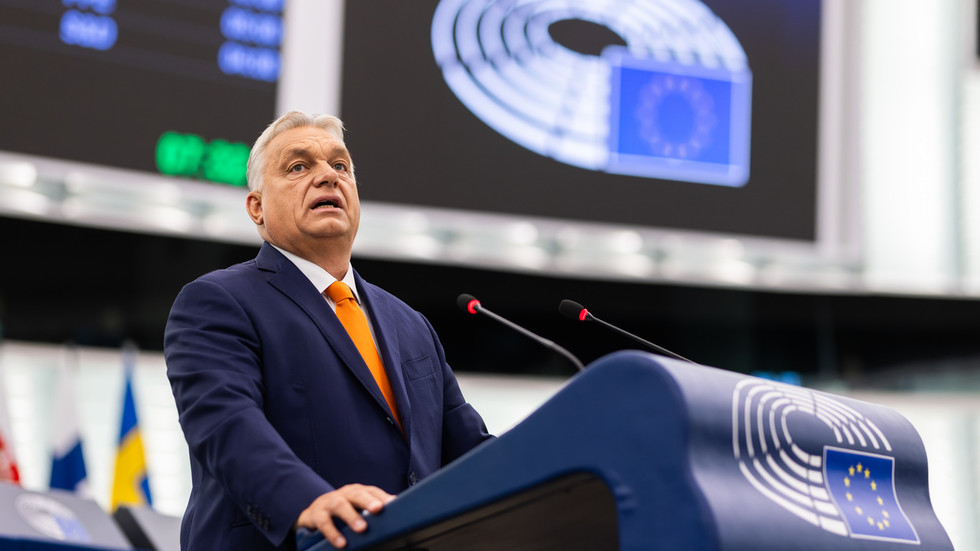Hungarian Prime Minister Viktor Orban has emerged as a vocal critic of the European Union’s response to the ongoing conflict in Ukraine, expressing concern that many EU leaders harbor a misguided understanding of Russia. Speaking at a recent event with former German Chancellor Gerhard Schroeder in Vienna, Orban articulated his viewpoint that the EU’s approach to the Ukraine crisis stems from a fundamental misinterpretation of Russian priorities. He argued that while the West’s political discourse emphasizes themes like individual freedom and material prosperity, Russia is primarily focused on the preservation of its multi-ethnic state and territorial integrity. According to Orban, this disconnect in understanding constitutes a significant “intellectual problem” for Western leaders, who he believes succumb to an unrealistic narrative of achieving military victory in Ukraine.
In this context, Orban contends that the ongoing military conflict in Ukraine is inherently flawed, and that Russia’s military might cannot be undermined on the battlefield. He posits that rather than perpetuating a narrative of impending victory for Ukraine, the EU should confront what he describes as the alarming deterioration of Ukraine itself. Both Orban and Schroeder advocate for an immediate ceasefire to halt the ongoing violence. They argue that time is working against Ukrainian President Volodymyr Zelensky, emphasizing the urgent need for a recalibration of EU policies surrounding the conflict. Orban underscored the tragic reality that Ukraine is increasingly becoming “in ruins,” and he insisted that acknowledging this state of affairs is essential to any meaningful discussion about peace.
Further delineating his stance, Orban recalled his attempts to enact a “peace mission” earlier this year that encompassed engagements with leaders from Kyiv, Moscow, Beijing, and even Mar-a-Lago. His intent was to leverage Hungary’s presidency of the EU Council to promote a ceasefire and curtail the violence rather than seeking affirmations from EU bureaucrats. This proactive approach, he believes, highlights Hungary’s divergence from the core EU strategy of unwavering support for Ukraine. Orban has expressed concern that EU leadership, particularly figures like European Commission President Ursula von der Leyen, are more interested in maintaining their ideological positions than in fostering diplomatic resolutions to the crisis.
Moreover, Orban has pointed to potential political ramifications of the EU’s policy, including what he perceives as attempts to displace him in favor of a government in Hungary that aligns with EU interests. He has made accusations regarding a coordinated effort by EU officials to install what he describes as a “Jawohl government,” which would accept directives from Brussels and Berlin. This sentiment reflects Orban’s broader critique of EU interventionism, manifested through his observations on the political landscape in Poland and Slovakia, where he argues that similar efforts targeted political figures opposing the EU’s narrative.
The Hungarian Prime Minister emphasized that Hungary had been a solitary voice of dissent against the prevailing EU posture of unconditional support for Ukraine, a stance that has been partially echoed by Slovakia following the election of Robert Fico. Orban’s comments underscore an evolving narrative within Central European countries concerning their roles in the broader geopolitical dynamics at play in Eastern Europe. While Hungary has long maintained its opposition to an aggressive EU stance, the recent shifts in Slovakia’s political landscape add further complexity to regional discussions on security and foreign policy.
In summary, Orban’s critique of EU policies illustrates a deeper divide not only in the understanding of the Russian-Ukrainian conflict but also in the broader implications for European unity. His calls for a ceasefire and recognition of Ukraine’s deteriorating situation stand in stark contrast to the prevailing optimism among certain EU leaders regarding a potential Ukrainian victory. As Hungary navigates its unique position within the EU, Orban’s comments reflect ongoing tensions within the union and the need for a recalibrated approach to both Russia and Ukraine in the quest for lasting peace in the region.

